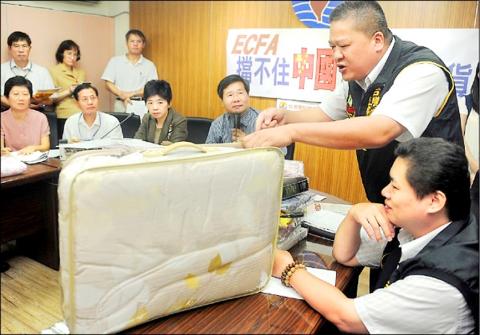The Ministry of Economic Affairs (MOEA) last night announced to rescind a notice it previously publicized on July 3 allowing the import of Chinese bedding products.
The decision came after complaints from local bedding product industry leaders who on Thursday said the imports would spell doom for the local industry.
The businesspeople said they have just found out that the MOEA’s Bureau of Foreign Trade held a cross-departmental review on June 20 and allowed the import of six items from China, including cotton and synthetic fiber products used in bedding.

Photo: Cheng Hung-ta, Taipei Times
The policy has “doomed” the local bedding industry, they said.
The administration of former president Ma Ying-jeou (馬英九) had limited the imports to items such as fitted sheets, due to pressure from local industry, the businesspeople said, adding that despite limitations, incidents of Chinese-made products masquerading as Taiwanese brands took place.
The Ma administration allowed the import of synthetic fibers and cotton materials in a bid to use them to increase the output of products for export, they said.
The policy was unregulated, causing companies to sell products in the domestic market, leading to the oversaturation of low-quality products, especially in traditional markets, the businesspeople said.
“The Democratic Progressive Party’s [DPP] decision would allow Chinese-manufactured products to further dominate the domestic market,” they said.
The ministry’s failure to communicate with the local industry prior to the decision would severely affect the operations of at least 80 percent of domestic bedding factories, Taiwan Bedding Industry Alliance chairperson Huang Kuang-yi (黃光藝) said.
The DPP government’s actions shows that its claim to be “the administration most willing to communicate” with the public to be false, Huang said.
Bureau officials said there is no organization representing the bedding industry, when asked why they failed to communicate with industry leaders.
However, business leaders said there are local bedding industry unions in Taipei and New Taipei City, as well as the Taiwan Bedding Industry Alliance.
When asked about the timing of the announcement, officials said it came after approval of an application for importing the items.

Taiwan yesterday denied Chinese allegations that its military was behind a cyberattack on a technology company in Guangzhou, after city authorities issued warrants for 20 suspects. The Guangzhou Municipal Public Security Bureau earlier yesterday issued warrants for 20 people it identified as members of the Information, Communications and Electronic Force Command (ICEFCOM). The bureau alleged they were behind a May 20 cyberattack targeting the backend system of a self-service facility at the company. “ICEFCOM, under Taiwan’s ruling Democratic Progressive Party, directed the illegal attack,” the warrant says. The bureau placed a bounty of 10,000 yuan (US$1,392) on each of the 20 people named in

The High Court yesterday found a New Taipei City woman guilty of charges related to helping Beijing secure surrender agreements from military service members. Lee Huei-hsin (李慧馨) was sentenced to six years and eight months in prison for breaching the National Security Act (國家安全法), making illegal compacts with government employees and bribery, the court said. The verdict is final. Lee, the manager of a temple in the city’s Lujhou District (蘆洲), was accused of arranging for eight service members to make surrender pledges to the Chinese People’s Liberation Army in exchange for money, the court said. The pledges, which required them to provide identification

Nine retired generals from Taiwan, Japan and the US have been invited to participate in a tabletop exercise hosted by the Taipei School of Economics and Political Science Foundation tomorrow and Wednesday that simulates a potential Chinese invasion of Taiwan in 2030, the foundation said yesterday. The five retired Taiwanese generals would include retired admiral Lee Hsi-min (李喜明), joined by retired US Navy admiral Michael Mullen and former chief of staff of the Japan Self-Defense Forces general Shigeru Iwasaki, it said. The simulation aims to offer strategic insights into regional security and peace in the Taiwan Strait, it added. Foundation chair Huang Huang-hsiung

’DISTORTION’: Beijing’s assertion that the US agreed with its position on Taiwan is a recurring tactic it uses to falsely reinforce its sovereignty claims, MOFA said The Ministry of Foreign Affairs (MOFA) yesterday said Chinese state media deliberately distorted Taiwan’s sovereign status, following reports that US President Donald Trump agreed to uphold the “one China” policy in a phone call with Chinese President Xi Jinping (習近平). During the more than one-hour-long call, Xi urged Trump to retreat from trade measures that roiled the global economy and cautioned him against threatening steps on Taiwan, a Chinese government summary of the call said. China’s official Xinhua news agency quoted Xi as saying that the US should handle the Taiwan issue cautiously and avoid the two countries being drawn into dangerous